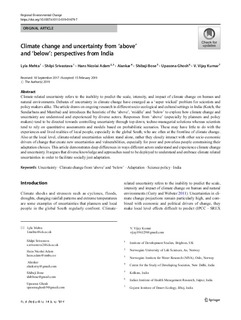| dc.contributor.author | Lyla, Mehta | |
| dc.contributor.author | Srivastava, Shilpi | |
| dc.contributor.author | Adam, Hans Nicolai | |
| dc.contributor.author | Alankar, A. | |
| dc.contributor.author | Bose, Shibaji | |
| dc.contributor.author | Ghosh, Upasona | |
| dc.contributor.author | Vijay Kumar, V | |
| dc.date.accessioned | 2019-08-14T07:27:24Z | |
| dc.date.available | 2019-08-14T07:27:24Z | |
| dc.date.created | 2019-08-02T14:54:33Z | |
| dc.date.issued | 2019 | |
| dc.identifier.citation | Regional Environmental Change. 2019, 19 (6), 1533-1547. | nb_NO |
| dc.identifier.issn | 1436-3798 | |
| dc.identifier.uri | http://hdl.handle.net/11250/2608193 | |
| dc.description.abstract | Climate-related uncertainty refers to the inability to predict the scale, intensity, and impact of climate change on human and natural environments. Debates of uncertainty in climate change have emerged as a ‘super wicked’ problem for scientists and policy makers alike. The article draws on ongoing research in different socio-ecological and cultural settings in India (Kutch, the Sundarbans and Mumbai) and introduces the heuristic of the ‘above’, ‘middle’ and ‘below’ to explore how climate change and uncertainty are understood and experienced by diverse actors. Responses from ‘above’ (especially by planners and policy makers) tend to be directed towards controlling uncertainty through top-down, techno-managerial solutions whereas scientists tend to rely on quantitative assessments and models based on probabilistic scenarios. These may have little to do with the experiences and lived realities of local people, especially in the global South, who are often at the frontline of climate change. Also at the local level, climate-related uncertainties seldom stand alone, rather they closely interact with other socio-economic drivers of change that create new uncertainties and vulnerabilities, especially for poor and powerless people constraining their adaptation choices. This article demonstrates deep differences in ways different actors understand and experience climate change and uncertainty. It argues that diverse knowledge and approaches need to be deployed to understand and embrace climate related uncertainties in order to facilitate socially just adaptation. | nb_NO |
| dc.language.iso | eng | nb_NO |
| dc.rights | Attribution-NonCommercial-NoDerivatives 4.0 Internasjonal | * |
| dc.rights.uri | http://creativecommons.org/licenses/by-nc-nd/4.0/deed.no | * |
| dc.title | Climate change and uncertainty from ‘above’ and ‘below’: perspectives from India | nb_NO |
| dc.type | Journal article | nb_NO |
| dc.type | Peer reviewed | nb_NO |
| dc.description.version | publishedVersion | nb_NO |
| dc.source.pagenumber | 1533-1547 | nb_NO |
| dc.source.volume | 19 | nb_NO |
| dc.source.journal | Regional Environmental Change | nb_NO |
| dc.source.issue | 6 | nb_NO |
| dc.identifier.doi | https://doi.org/10.1007/s10113-019-01479-7 | |
| dc.identifier.cristin | 1713836 | |
| dc.relation.project | Norges forskningsråd: 235449 | nb_NO |
| cristin.unitcode | 192,13,1,0 | |
| cristin.unitname | Institutt for internasjonale miljø- og utviklingsstudier | |
| cristin.ispublished | true | |
| cristin.qualitycode | 1 | |

